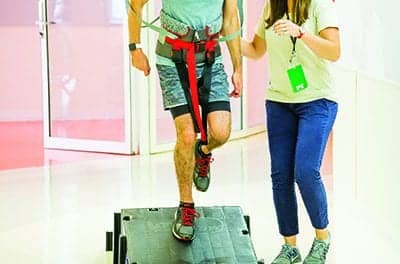Google Glass is currently being trialed to evaluate its ability to serve as an assistive aid to help individuals with Parkinson’s disease (PD) remain independent longer. Newcastle University experts state in a news release from the university that they are investigating the Glass, which is a wearable computer being developed by Google. Glass appears similar to a pair of designer eyeglasses, and its system functions much in the way that a hands-free smartphone does, displaying information on the lens of the Glass. The technology, the release notes, is voice-operated and linked to the Internet.
See this research in action here
The university release adds that while it is not currently available outside of the US, Google donated five pairs of Glass at Newcastle University in order to allow researchers to determine how they might be used to support individuals with long-term conditions.
An initial project was reportedly first facilitated by a team based in the university’s Digital Interaction Group in Culture Lab, part of the School of Computing Science. The project places a primary focus on the acceptability of Glass, and the team has been working with a group of PD volunteers aged 46 to 70 years old.
In the next phase of the project, the release reports that researchers are using the technology to offer discreet prompts linked to key behaviors associated with PD, such as reminding the individual to speak up or to swallow in order to prevent drooling. The release notes that Glass can also be used as a reminder for items that include medication and appointments. Additionally, the team will assess how the motion sensors in Glass can be used to support individuals with “freezing.”
The release designates the trial, led by John Vines, PhD, Roisin McNaney, PhD student, and Dr Ivan Poliakov, as the first UK trial of Glass. The team is slated to present their initial findings at the ACM Human Factors in Computing Systems (CHI) 2014 and will demonstrate how emerging technologies may hold promise in supporting individuals with progressive diseases, such as PD and dementia.
McNaney, who is a speech and language therapist with a PhD that has focused primarily on use of external cues such as behavioral prompts, emphasizes that a key challenge lies in finding technology that proves useful and discreet.
“People with Parkinson’s are already coping with so much, and one of the main causes of social isolation is the stigma around behaviors such as drooling and tremor, which they have no control over. The last thing we want is a system of cueing which is so obvious, it adds to people’s overall embarrassment,” McNaney says.
Vines echoes McNaney’s sentiment in the release, stating that, “Technology has the potential to play a central role in the development and improvement of people’s lives. The challenge is understanding everyone’s different needs and tailoring that technology so that it makes a real impact on society.”
[Source: Newcastle University]




